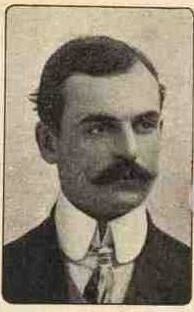Charles Cuvillier
Charles Cuvillier was born on 24 April 1877 in Paris (France). He studied at the Paris conservatory under Gabriel Faure and Jules Massenet. After his studies be began a career as an operetta composer. His first work "Avant-hier matin" dates from 1905 and became an immediate success. Dozens of operettas followed in the next decades and several international hits were among his output: "Son p'tit frere" (1907), "Afgar" (1909), "Der lila Domino" (1911) or "La reine s'amuse" (1912). During World War I Charles Cuvillier fought at war for the French, but could reestablish an international reputation afterwards. Especially in Great Britain his operettas were a great success in the years between the wars. Charles Cuvillier continued to compose operettas till World War II. Charles Cuvillier died on 14 February 1955 in Paris (France).
Der lila Domino
In my possession is the handwritten full score of the operetta "Der lila Domino" by Charles Cuvillier. The work was composed in 1911 on a libretto by Emerich von Gatti and Bela Jenbach.
The manuscript in my possession was very likely created by a copyist and given to the publishing house Schmiedell in Vienna. On several pages in the manuscript the stamp "Theaterverlag / F. W. Schmiedell & Co." appears. This is of interest as Schmiedell was taken over by the Theaterverlag Eirich in 1912. For that reason this full score in manuscript must be one of the earliest copies.
Schmiedell bought the rights of the work and offered "Der lila Domino" since 1911 to theatres in the whole world. At that time Charles Cuvillier was already a big name in the operetta genre and theatres in Leipzig, Hamburg or Pest showed immediate interest in the new work, also Andreas Dippel who bought the performance rights for the US.
The first performance took place on 3 February 1912 in Leipzig. The premiere was scheduled for late 1911, but several delays and health issues of the cast lagged the creation. The reviews were divided - some praised the work, for others the operetta fell short the expectations. But for all critics the biggest weakness was the German libretto. That is important to know because the work only became an international hit after being translated to English and being revised. Especially in London "The Lilac Domino" became a ongoing sensation with over 700 performances around 1918.
With this story in mind the original full score of "Der lila Domino" is of special historical interest. In addition to this manuscript I also own the published "Vollständiges Regiebuch" (complete production book) that contains the libretto but also exact stage settings and further notes for a performance. It was published by Schmiedell in Vienna and Erhard Schultz in Leipzig and presents the staging by Fritz Karl done for the world premiere in Leipzig on 3 February 1912.
For information purposes I have typeset the overture of the operetta, which - as far as I know - was omitted from the revised versions:


